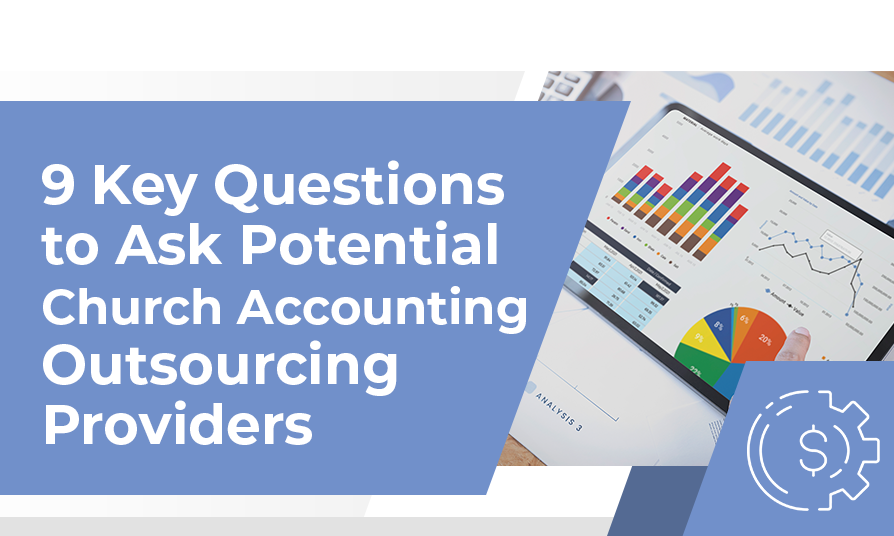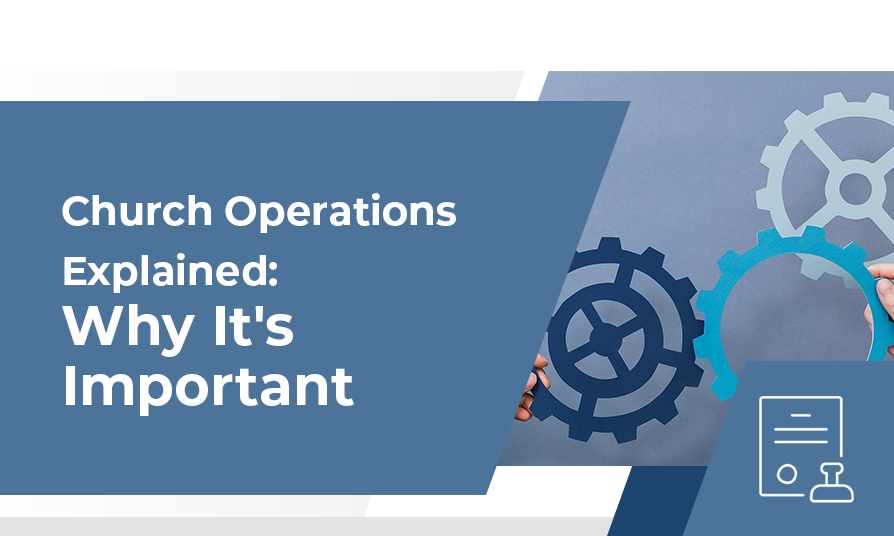Leading a church involves all we typically think of as “pastoral” work plus a plethora of behind-the-scenes tasks. One significant responsibility of church leadership is to be an excellent steward of church finances. As people tithe, they’re trusting the church to use that money wisely. To make that happen, you need strong financial controls and processes in place. While many churches may hire someone to handle the accounting functions in-house, another option is to hire an outsourcing company.
Why should a church consider outsourcing?
Reason #1: Expertise
If you hire an outsourcing company that works with several churches, you’ll benefit from that breadth of experience. They can tell you what’s worked for other churches in setting up restricted funds, establishing an annual budgeting process, and how to generate financial reports for lenders. You may also be able to leverage the knowledge of CPAs along with having someone handle the day-to-day bookkeeping.
Reason #2: Reduced fraud risk
Unfortunately, churches aren’t immune to theft. There are several examples of employees stealing from the church. One way outsourcing can help prevent theft is by ensuring segregation of duties. For example, an outsourcing company will have processes that require that the person who can create a new vendor within the accounting software is not also able to approve an invoice for payment or sign a check. This keeps an individual from creating a new (fake) vendor, entering a fake invoice, approving it for payment, then signing a check to pay that invoice.
Reason #3: Increased focus on finances
Let’s face it – there are many instances in the schedule of a church where it’s “all hands on deck.” Every staff member, regardless of function, gets pulled into finishing up Christmas decorations or setting up for an event. When an outsourcer handles the accounting functions, you’re able to focus on church finances no matter what you’re dealing with at the church.
Before you hire an outsourcing company to handle your church’s accounting, take the time needed to evaluate potential vendors carefully.
Here are several questions to ask potential outsourcers:
Question #1: Does your company focus on serving the church?
The accounting rules and processes for churches are different from for-profit businesses and even nonprofit organizations. You want an outsourcer with several years of experience working with and for churches.
Question #2: Do you have church clients of a similar size as ours?
If an outsourcer only works with mega churches and yours averages 200 on a Sunday, that won’t be a good fit. A company that works with a variety of church sizes and structures should have the experience necessary to provide your leadership team with the financial reports and support required.
Question #3: How long have you been in business?
A company that’s been in business for several years will have references and a proven track record of how they serve their clients. While newer businesses can offer excellent service, they will require even more due diligence in the selection process than one with a long history of serving churches.
Question #4: What are the qualifications of your staff members?
An outsourcing vendor where most employees have an accounting degree plus several years of experience is a great place to start. You’ll also want to ask about their review processes to see if a CPA reviews certain reports or transactions to confirm that their staff completed their work accurately.
Question #5: What accounting software do you use?
This goes to discovering whether a vendor will require your church staff to use the accounting software the vendor uses or not. If you’ve already invested a significant amount of time and money into your current accounting system, that could be a deciding factor for one vendor versus another.
Question #6: How will our team and yours transmit financial information?
Depending on the tasks you’re outsourcing, you’ll need to provide the outsourcer with financial data such as invoices, purchase orders, bank statements, payroll changes, and more. The outsourcer will need to provide your team with financial information as well. Ideally, you’re both able to access the accounting software to transmit most of that information. Find out if a potential outsourcing company has a secure online portal to share financial data and documents as well.
Question #7: How do you keep your client’s financial records secure?
Financial information is sensitive data and needs to be treated as such. Hacking and data theft are real risks, so you’ll want to look for a company that takes prudent steps to protect their client’s data. Ask about their protocols and processes to secure data online and to keep any paper records secure as well.
Question #8: What does your new client on-boarding process look like?
The answer to this question can help you gauge how detailed and intentional a company is when it comes to getting new customers up and running. Most companies should have a questionnaire for you to fill out, a standard checklist that they complete with every church client, and likely a series of working sessions to ensure a successful start.
Question #9: What financial reports will you provide and at what frequency?
You’ll want at least the standard monthly reports to help you analyze the church’s financial health and progress. However, a vendor might also provide weekly reports on giving totals, cash flow projections, and other key metrics that can help your leadership team make informed decisions.
Entrusting an outside organization to handle the day-to-day accounting functions of your church can be a daunting prospect. However, outsourcing can free up time to focus on other areas, ensure proper financial processes, and reduce fraud risk. If you’re considering outsourcing, take your time to find the best vendor for your church and establish an excellent relationship from the start.



